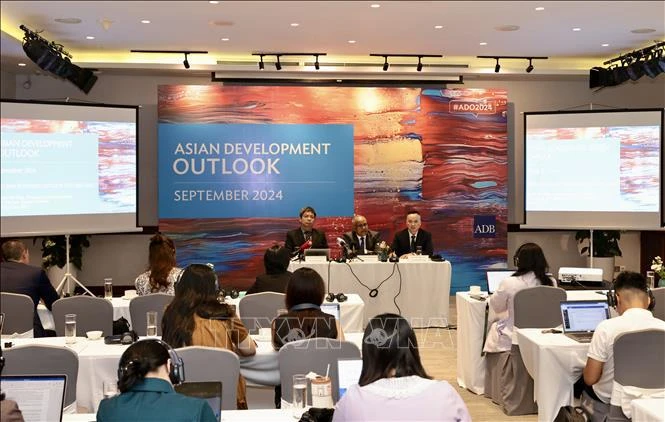WNAM REPORT: The Asian Development Bank (ADB) maintained its positive economic outlook for Vietnam, forecasting the country’s GDP growth at 6% in 2024 and 6.2% in the following year.
At a press conference to launch the Asian Development Outlook (ADO) report on September 25, ADB Country Director for Vietnam Shantanu Chakraborty said the Vietnamese economy showed robust recovery in the first half and will keep its growth momentum despite global uncertainties, attributing the steady recovery to improving industrial production and a strong rebound in trade.
The industrial sector continued to be the main motive of growth, with external demand for electronic products fueling domestic production. The economic recovery was also backed by the rebound of the tourism sector and stable agricultural output, he stressed.
However, weak domestic demand and gloomy global economic prospects will add to the uncertainties, he said, adding that the US Federal Reserve’s rate cuts together with similar moves from the European Central Bank may weaken Vietnam’s exports.
The bank also predicted Vietnam’s inflation rate at 4% in the two years although geopolitical tensions, including conflicts in the Middle East and that between Russia and Ukraine, could push up oil prices with knock-on effects on inflation.
It also highlighted several risks which could slow down Vietnam’s economic growth, including weak demand in major economies, increasing protectionism, and instabilities related to the US presidential election in November that may lead to trade fragmentation, adversely affecting exports, manufacturing activity, and employment.
ADB experts suggested Vietnam boost domestic demand via stronger fiscal stimulus measures such as accelerating public investment while maintaining low interest rates. They held that coordinated policy measures are necessary to foster the economic recovery, given relative price stability and softened demand.
The country’s monetary policy should continue to aim for both price stability and growth, despite limited policy space. However, the heightened risk of nonperforming loans due to continued regulatory relaxation on loan extensions limits the potential for further monetary easing. Any additional loosening of monetary policy should be closely coordinated with an expansionary fiscal policy, along with accelerating institutional reforms to support the economy, they said.
Regarding Vietnam’s typhoon Yagi relief efforts, ADB Chief Economist Nguyen Ba Hung said the best mechanisms for reconstruction are to rely on insurance and budget support like public investment in post-disaster infrastructure building and agricultural production.


